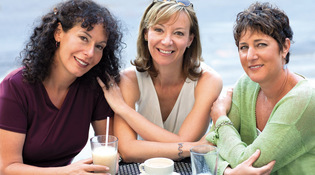 loading
loading
Arts & CultureMemo to single women: don’t settle. Take action. Mark ThomasThe three formerly single, formerly childless authors of Three Wishes, from left to right: Carey Goldberg ’82, Pamela Ferdinand, and Beth Jones. View full imageCarey Goldberg ’82 has been writing about serious intellectual subjects throughout her career, from contemporary Russian art to how cancer metastasizes. Now she’s turned her attention to something different: magic sperm. Three Wishes: A True Story of Good Friends, Crushing Heartbreak, and Astonishing Luck on Our Way to Love and Motherhood is a laugh-cry-and-cheer book, co-authored by Goldberg, Beth Jones, and Pamela Ferdinand. Goldberg spoke with Lenore Skenazy ’81, author of Free-Range Kids. Y: What’s your book about? G: The book begins when I turned 39 and was still single and decided to become a single mother. So I bought eight vials of donor sperm. But just as those vials arrived in my clinic’s freezer, I met the man who would become my husband and the father of my children. So I passed the sperm on to my friend Beth, who had just come out of a horrible divorce. But as soon as Beth got the sperm, she, too, met the man who would become her husband and the father of her child. So she passed the sperm on to our friend Pam, and the same thing happened! She met a man and had a baby. So it’s kind of a sisterhood of the traveling sperm. Y: Maybe that should have been your title? G: We were going to call it The Lucky Sperm. But people thought “sperm” was kind of a yucky word. Y: How did you meet the other two women? G: I was the Boston bureau chief of the New York Times and Pam was covering New England for the Washington Post—we became kind of friendly competitors. And Pam was the matchmaker between me and Beth. Y: So is it a celebration of older motherhood or a cautionary tale? G: When I was a single woman in my 30s, all the news I ever got about my prospects for marrying and having children was so gloom-and-doom. I really felt like it could be helpful to single women to hear that the outlook might not be nearly so gloomy. But the book makes clear that having a baby this late is no picnic. I had one miscarriage. Both of my co-authors terminated pregnancies because they had chromosomal disorders. Also, it’s clear that none of us chose to wait so long—it was just that the right man didn’t come along. The book’s message is that sometimes in life there comes a time when you have to stop waiting and take action. Y: What do you think of Marry Him: The Case for Settling for Mr. Good Enough [by Lori Gottlieb ’89; reviewed in March/April]? G: Our book is the antidote to Marry Him! Because, ultimately, all three of us chose to become single mothers rather than settle for the wrong guy, and ended up very happy. If I had followed the advice in Marry Him, I would have settled in Maine at age 28, never gone to Moscow, never worked for the New York Times—basically missed the pinnacle of my career—and probably lived out my life dissatisfied. Y: Is sperm the new vodka? It gave you dating courage. G: I no longer had to be in such a rush to find father material, and that changed how I felt when I dated. But I still vastly preferred to have a child with a man rather than a donor, so it didn’t totally change the dynamic. Y: What advice would you give to Yale undergrads about dating, motherhood, and marriage? G: My daughter Liliana is now eight. Recently I was playing the game of Life with her, and she reached the point on the board where your little car has to stop and you get married and put a spouse in. And my daughter said, “When I grow up I don’t think I’ll get married. I’ll just get some sperm.” And I found myself saying, “Well, that’s fine, but being married is really very nice too.”
The comment period has expired.
|
|